
IN THE TIME OF INCREASING OPPORTUNITIES THAT EMERGE IN THE AGRICULTURAL SECTOR AT THE BACK OF THE GLOBAL FOOD SUPPLY CRISIS, UKRAINE IS ONE OF THE MOST APPEALING PLAYERS ON THE WORLD FOOD MARKET
WRITTEN BY: LINA MYRONOVA, TETIANA KRAVCHENKO
The Chief Executive Officer of AgroGeneration, one of the leading agricultural producers in Ukraine, Sergiy Bulavin shares on operational efficiency of the company, appeals of the Ukrainian agricultural market versus the French market, and priorities in expectations of foreign investors in Ukraine, in particular those pertaining to transparency of laws, opening of the land market in 2021, and grounds for the significant difference in prices for agricultural lands in Ukraine and in EU countries.
What are the expectations of foreign investors (including the ones at your company) of the land market introduction in 2021 in Ukraine?
By and large, Ukraine is moving towards market economy. So the issue of land market opening, which has been postponed for many years in row, should be solved sooner or later. This means that the issue of investors should rise as well.
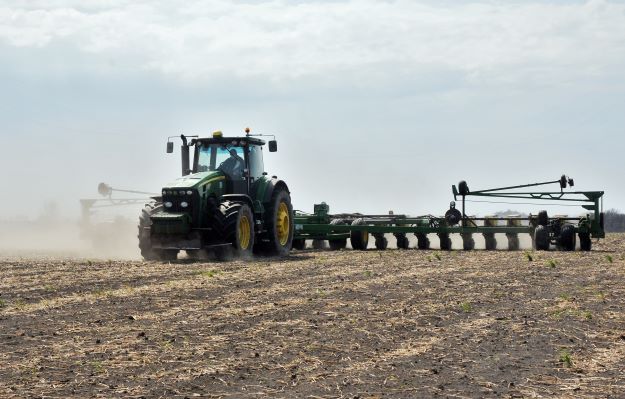
AGROGENERATION CONCENTRATED C.A. 60,000 HA OF FARMLAND IN THE KHARKIV REGION
The coming of real estate investors is expected in the long-term perspective, especially after they open the market for international players. Next, these real estate investors will give large portions of their land for rent to companies operating in agriculture. There will be no need to seek numerous land owners in order to step into the big agriculture business, renting land from one or several such investors would be enough. Besides, there will emerge a special kind of agricultural companies with a private equity approach. It is a worldwide practice when agricultural companies buy lands with mediocre quality and start cultivating the land along with improving its condition. Then they further resell or give for rent such lands at higher prices. There are different kinds of companies operating on the land market at the global scale. These are either operating companies that rent land for growing and selling crops, or agricultural companies that own most of the land they operate and rent only a part of it.
The intention of AgroGeneration is to remain an effective operating company. Whether it will buy land or not depends on whether AgroGeneration will have shareholders or investors focused on real estate investments.
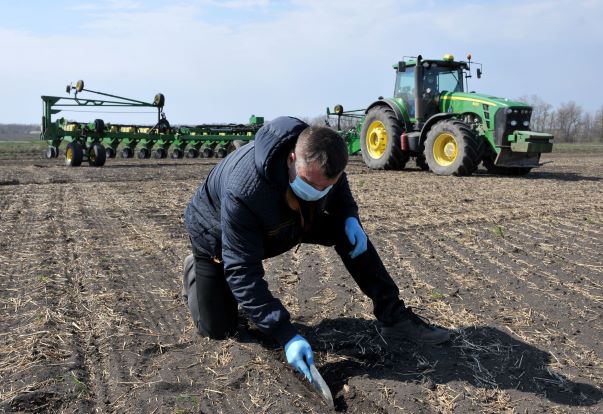
IN THE PANDEMIC ALL STAFF IS COMPLETELY EQUIPPED WITH PROTECTIVE MEANS
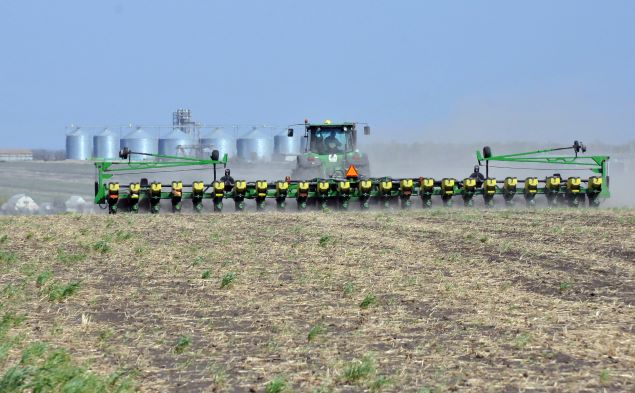
THE COMPANY HAS TWO ELEVATORS OF ITS OWN
How big is the risk that the extremely high difference in prices for land in Ukraine and EU will eventually lead to a situation like in Argentina or Brazil at the beginning of 2000s (reselling, riots, significant leap in food prices for population)?
There are certain grounds for the difference in prices for land in Ukraine and in EU countries. For the time being land in Ukraine is cheaper than in other European countries because of the risks that exist for potential buyers. First of all, these are the country’s political and economic risks. Currently they are way too high comparing to the EU countries. Also, foreign investors face limitations related to land purchase. However, regardless of such limitations, without political stability resulting in the economic stability one can not even discuss the possibility that the price per hectare in Ukraine may be the same as, let’s say, in the Czech Republic or Poland.
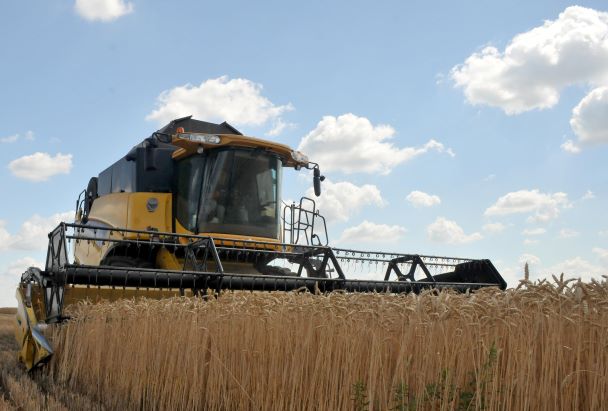
OPTIMIZATION OF PRODUCTION PROCESSES AND INNOVATIVE TECHNOLOGIES UNDERPIN THE COMPANY’S ECONOMIC SUCCESS STRATEGY
As for the reselling of lands, it will most likely take place. But it will be a step-by-step, gradual process fully dependent on the opening of the land market for all players. While foreigners are not allowed to do this yet, Ukraine’s very own citizens and residents will be the land jobbers making attempts to buy land as cheap as possible, and resell it to international players after the ban on such deals is lifted.
Concerning the land riots, there may be no grounds for such riots since Ukraine is heavily integrated into the international market. There is market and there is price. If the price per hectare is acceptable – one can sell it immediately, if it’s not – one can wait for better times. There will neither be any significant rise in food prices for population for the same reason – Ukraine is strongly integrated in international markets. Let’s take wheat, which we sell for export, as an example. Its price is formed by the world market supply, which is in no way related to the price per hectare of land. Thus, food prices for population are not dependent on the land market situation in a specific country at all.
What is the company’s land bank today?
AgroGeneration has concentrated c.a. 60,000 hectares of arable land in the Kharkiv region. Today AgroGeneration is one of the leading agricultural producers in Ukraine. The company’s core business is grains and oil commodity crop farming. Its operations are fully provided with modern machinery and infrastructure.
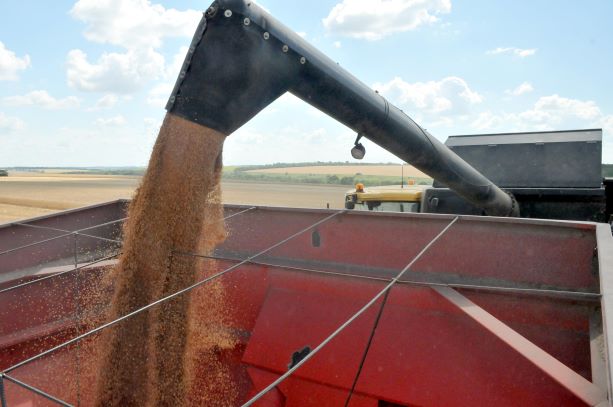
WHEAT AND SUNFLOWER ARE THE MAIN TWO CROPS IN 2019/2020
One can not imagine agricultural production without people. How did quarantine limitations impact the company’s efficiency and human resource policy?
Major asset of any company is people working for it and aiming to increase production efficiency. AgroGeneration is a strong team of professionals with a proven track-record in agriculture; its managers along with highly qualified technical and production specialists are able to achieve great performance.
We cherish our employees. We strictly adhered to quarantine rules right from the first days of its introduction, even during the so-called “relief” months. We didn’t insist on people coming to the office. For the time of quarantine employees of the corporate center completely moved to remote work. They come to the office on an as-needed basis and strictly follow quarantine requirements, such as hand disinfection, wearing gloves and masks, etc. Back in the middle of March the company bought protective means for all employees – for those who work on premise, as well for those who work in fields. This allowed to timely accomplish all planned field operations, such as sowing, application of UANs, CPPs, harvesting, tillage, in compliance with agronomical terms.
AgroGeneration’s policy is focused on social protection of people. For this reason during quarantine we didn’t dismiss anyone, didn’t decrease salaries, and paid them on time and in full. If a person got sick and proved to be COVID-19 positive, he/she could count on financial support, sick pay, and, of course, retention of job.
As a socially responsible enterprise, agricultural company AgroGeneration took care of health of its land owners as well. In spring district hospitals in Valky, Nova Vodolaha, Pervomaiskyi, Balakleia, Barvinkove, Velykyi Burluk, and Blyzniuky have been provided with equipment for disease testing and prevention of pandemic spread.
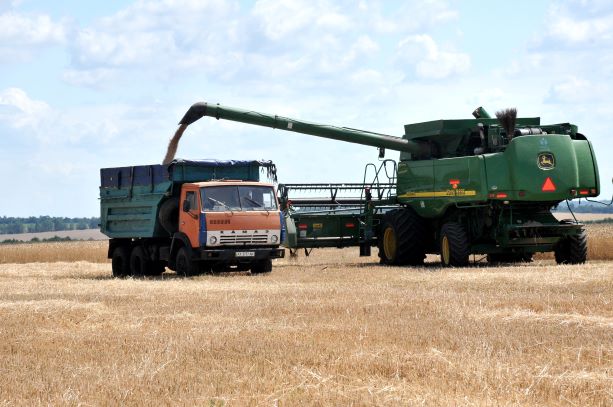
AGRIHOLDING IS SOCIALLY AND ECONOMICALLY RESPONSIBLE
AgroGeneration’s report states that coronavirus pandemic had no negative impact on operations of the company and that EBITDA for H1 2020 improved totaling EUR 2.83 million. What helped to offset the influence of pandemic and what is your outlook for the end of the year?
As a matter of fact, the influence of COVID-19 on the agriculture business is insignificant. Agribusiness depends on two key factors – weather and prices on the world market, at which we sell our commodity. However this is the case for 2020. In the future the pandemic may have a stronger impact on the agricultural sector. Because of quarantine restrictions people limit travelling. This means that the need for biodiesel may decrease. It may cause reduction in consumption of crops processed for biofuel, such as corn for example. Today the global economic crisis combined with coronavirus crisis made many people reconsider their diets. In the future consumers may decide to shift from protein foods to foods rich in carbohydrates. This in turn may also change the sowing maps and, as a result, the map of agricultural commodity processing.
Speaking of AgroGeneration, early on in the pandemic we realized that quarantine measures would last for a while, not just for a week or a month. We started preparations for this period of time at the beginning of 2020. We made the best unbiased assessment of the new reality and offset the majority of risks.
Within a short time wherever possible we moved teams to remote or mixed work.We have effectively introduced online sessions. We’ve learnt how to work without eye-to-eye meetings and substituted them for online calls. This formed a new communication system with employees and partners.
Since the company stopped needing large office facilities, we undertook their optimization in Kyiv, by relocating to premises near Palats Sportu, and in Paris, by moving from the office at Pompe Street to premises at Boulevard Malesherbes.
There were also other optimization opportunities, which we wouldn’t probably make use of in other times. But because we realized that the situation around pandemic and economic crisis may last for a long time, we began to optimize all our operations and activities.
More than a half of the company’s revenue in 2019 was generated here in Ukraine (EUR 15.86 million of EUR 30.59 million). Does this mean that the agricultural market in Ukraine is more attractive than in France? What are the future prospects?
Ukrainian agricultural market is more attractive, as a matter of fact. That’s because Ukraine has almost perfect conditions for doing business in agriculture – mild moderate climate, fertile soil, and highly skilled human resources. Until 2014 AgroGeneration had lands in Argentina. Yet, there were more risks in that country and the market appeared to be less economically appealing than in Ukraine. Now company’s lands are concentrated in the Kharkiv region where it has real prospects for development. Further opportunities depend on food prices on the global market and on development of the economic crisis. But with the potential the Company has now, i.e. skilled staff, streamlined processes with regard to tillage, crop growing, harvesting and storage, we hope to overcome the mentioned challenges and go forward.
What export commodities of the company have the strongest positions?
It is unlikely that AgroGeneration will be among top ten Ukrainian exporters of own commodities this year. In the 2019/2020 agrarian season the company focused on growing two main crops that it sells both on the internal and external markets – wheat and sunflower. We produced oilseeds exclusively for Ukrainian processors from oil extraction plants. In terms of wheat, we can brag about large amount of top quality milling wheat, which is very well bought by big local producers of flour, bread, and bakery products. So almost every loaf in Slobozhanshchyna will have a bit of AgroGeneration’s wheat. Due to large amounts of milling wheat we changed the customary balance we had in the previous years, when around a half of produced grain was exported, and slightly reduced the export share.
It is typical of the big agriculture business owners in Ukraine to manage their companies manually. Is this also common to western peers?
Micromanagement is uncommon to western companies, but there may be different cases. In my view, this kind of management is one of the signs that the owner is not quite “mature” for big business. Oftentimes micromanagement causes the increase of certain risks. So sooner or later they will come to life and the company will lose the dynamic development it could have by the effective management.
In 2019 the French Group AgroGeneration had EUR 27.65 million of net losses, whereas in the first half of 2020 it had EUR 5.46 million of net losses. What will be the 2020 result? What are the reasons for that?
This year we implemented numerous optimization initiatives and improved our profitability. At the beginning of the year AgroGeneration sold all of the crops it had in stock since 2019. It has successfully completed harvesting of early and late crops. AgroGeneration also kept on implementing the cost optimization initiatives announced at the end of 2019.
We’ve seen the first positive effects in the H1 2020 financial result, primarily owing to the reduction of general and administrative expenses. This also includes a decline in payroll due to head office structure optimization, as well as a reduction in management, listing, audit, and legal fees.
With regard to the improved profitability of harvested crops and increased financial indicators, one will be able to make final conclusions regarding 2020 net profit or EBITDA changes in January-February 2021. AgroGeneration, being a public company, traditionally publishes its full report on its website in April.
The Prime Minister of Ukraine Denys Shmyhal during presentation “Ukrainian Economy Audit and Economic Development Vectors until 2030” announced that irrigation development in Ukraine will open the opportunity to increase harvests by 2.5-3 times. What is your attitude to such forecasts?
We positively take such forecasts and irrigation in general. We believe that the majority of Ukrainian farms are in a critical need of irrigation, because it will not only increase yield, but will eventually improve economy of agricultural companies and reduce risks. But there are several underlying conditions for such projects to be widely implemented in Ukraine. The first one of them is land market, because development of irrigation is closely tied to capital expenses, and to make such expenses one needs to have ownership right to the land. Investors just won’t go for it if they may face the risk when after installing the irrigation system and improving soil fertility, they would see one or several land owners coming to terminate the lease agreement. In such a case their capital investments would simply be lost.
What’s the point of your cost optimization initiative announced at the end of 2019? How has pandemic impacted your plans?
Every company should continuously work on cost optimization. Yet we made use of the pandemic to manage own resources as efficiently as possible. In fact, pandemic was a catalyst that accelerated AgroGeneration’s shift to the new way of operation, first of all to remote work. This allowed reducing administrative expenses.
Production was another optimization focus. We moved to less intensive farming in order to mitigate financial risks relating to natural factors. For several succeeding years the Kharkiv region suffered from drought, which had an adverse impact on harvests. Our technologies aim not only at minimum tillage, but also at moderately intensive production. Optimal application of seed varieties and fertilizers allows finding balance between intensity and risks.
Realistic view of the pandemic allowed us to make decisions, which, I guess, would normally take a long time to make. Now when they yielded some positive results, we realize that we are on the right way to further development.
Source: https://issuu.com/72258/docs/chaspershih_n9_web/s/11632078
This article was originally written in Ukrainian and translated into English by AgroGeneration
